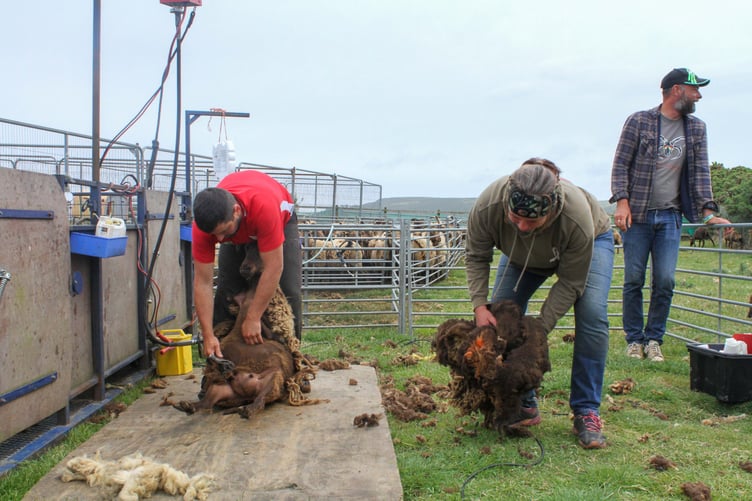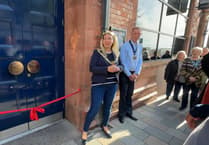In our recent feature about wool prices and farmers not being paid we incorrectly stated that wool collected from the island by Brannach Olann was sent to British Wool and that they set the prices paid to farmers here.
Andrew Hogley, chief executive officer at British Wool, contacted Food & Farming page to set the record straight. He was also keen to distance himself from the current situation for our farmers which he described as ‘disappointing’.
‘As a farmers’ cooperative British Wool is never pleased to see other farmers suffering. We hold sales every two or three weeks and sell around 1.2 million kilos of wool at each. So far this year we have sold 23 million kilos. The market is there and there’s no excuse for Isle of Man farmers not to have been paid for their wool,’ he said.
He explained that British Wool no longer has any involvement in wool going off the island to be sold.
He said: ‘Historically, the Isle of Man Government collected all the wool, graded it and sold it through our auctions. When the Isle of Man had wool ready to sell they would send it over.
‘We used to sell the Isle of Man wool at the end of each sale – around 120 tonnes (120,000 kilos) in all over the course of the year.
‘We know our buyers would pay for this wool – there’s some nice wool that comes from the island and there was always a market for it.’
When DEFA in the island stopped collecting the wool, the contract to collect and grade it went to a company called Brannach Olann, a wool-buying company based in Perth, in Scotland. Andrew Hogley insisted that British Wool were not given the opportunity to tender for this.
He said: ‘If they had approached us we would have been happy to provide that service in the Isle of Man. We have eight grading depots around the UK and will market wool on behalf of any UK farmer whatever their wool type or quantity.’
The overriding problem for wool for a number of years is that cheaper, mass-produced synthetic fibres have caused a decline in the use of wool in clothing and carpets.
But wool is finally starting to regain popularity and prices have been strengthening, albeit slowly.
One of the reasons for this it is that wool is such a sustainable product, but there is a bit more to it than that, as Andrew explained: ‘The sustainability story is strong but what end brands and consumers are starting to care about is the provenance, where the wool has come from, and its traceability. That’s how you add value.
‘Every bale of wool that we sell, we can identify which farmers it has come from.
‘The Isle of Man has a really good traceability story and I think this is where the Isle of Man has a fantastic opportunity for their wool.’
Traceability is also very much a part of the Brannach Olann model. It works with Woolkeepers, a quality assurance platform which records the movement of materials from farm gate to the shop front.
Alan Walsh, managing director of Brannach Olann, said: ‘The traceability of the wool we sell is guaranteed by external audit.’
The company was set up in 2019 with the aim of paying farmers a premium price for their wool by shortening the supply chain.
Its website states: ‘We believe there is a simpler and fairer way to work together with wool farmers and that’s why we are challenging the traditional wool sourcing systems.’
Mr Walsh said: ‘We’re going to buy directly from the farmers. We’re going to give you a product that’s 100% traceable and 100% British wool.’
He admitted that the current situation for Isle of Man farmers is ‘a bit of a mess’ caused by a number of factors, including staff shortages leading to a delay in actually collecting the wool from the island before it could be sent across to be sold though he added that they ‘had not been any slower’ than when DEFA had been doing this.
The major problem, he went on, was the process of actually paying farmers. When they were involved in the tendering process DEFA had said that they would arrange to pay the farmers with money received from Brannach Olann when the wool was sold.
Mr Walsh said: ‘My whole battle has been DEFA saying how they would help us but when it came to us paying the farmers they said: “No you’re on your own”.’
As Brannach Olann did not hold payment details for farmers in the island it has had to ask farmers to contact them individually with their details so that they can be paid.
Mr Walsh has assured farmers that things will be different for this year’s clip. He said: ‘This season I have a man in the island for the last two weeks of July and the whole of August so we should be done [collecting and grading] by the end of August.’
Sarah Comish, secretary of the Manx NFU, said: ‘The Manx National Farmers’ Union has been asking for assurances on the matter of payments and services both from the wool contractor and the department, for some time now. Communication to producers has been very poor.
‘We have had assurances from the contractor that payments for the 2021 clip are now in progress and that our members will start to see payments come in. If payment is not forthcoming we will look to the department to reinforce the conditions of the contract, and prevent any failure of the contractor to pay for the wool they have received from producers.’
Food & Farming also contacted DEFA for a comment and a spokesperson said: ‘Brannach Olann was awarded the contract following the approved government tender process which was open to anyone who chose to apply. A requirement within the tender was for the successful tenderer to provide all the required administration and payments to producers.
‘For obvious reasons the department couldn’t release wool producer bank details to Brannach Olann neither could it use wool weight data collected by Brannach Olann to pay people who had supplied wool to them. Brannach Ollan has assured the department that the payment process has begun as of July 8, 2022.’





Comments
This article has no comments yet. Be the first to leave a comment.